Exploring Open Theatres: A Cultural Shift in Dubai
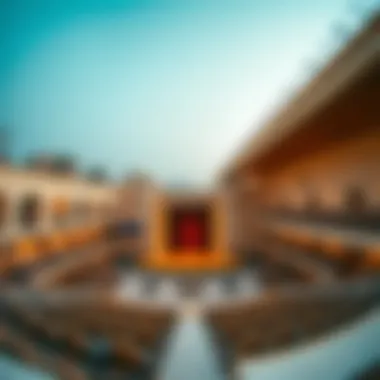
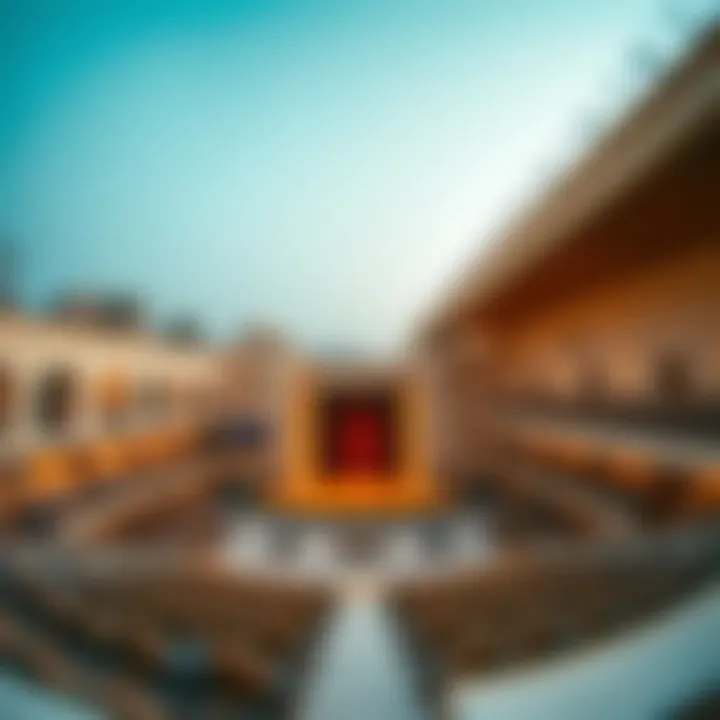
Intro
The emergence of open theatres in Dubai marks a fascinating intersection of culture, design, and community. These unique spaces are more than mere venues; they foster a sense of belonging and connection among residents and visitors alike. In a city renowned for its towering skyscrapers and opulent lifestyle, open theatres serve as refreshing oases, transforming the urban landscape into a vibrant tapestry of artistic expression.
Throughout this article, we will unpack the essence of open theatres in Dubai, shedding light on their architectural innovations and cultural importance. We will explore key examples such as Al Quoz’s Warehouse 421 and the breathtaking Dubai Opera Garden, which not only host performances but also engage the community in educational and interactive experiences. This narrative will also chart the challenges faced by these spaces in a rapidly evolving city, while also identifying promising opportunities for growth and engagement in the arts sector.
As we delve deeper, the significance of these theatres becomes increasingly apparent. They serve as platforms for local artists, stage international performances, and bring together diverse populations under the umbrella of shared artistic appreciation. The discussion will further encompass market trends and forecasts, as well as investment strategies for those looking to navigate this evolving landscape. The aim is to provide a comprehensive perspective for real estate agents, investors, and community members interested in the exciting developments on Dubai's cultural front.
The Concept of Open Theatre
Open theatres represent a unique intersection of art, community, and urban space. In the context of Dubai, this concept thrives against a backdrop of rapid development and cultural diversity. The importance of exploring the open theatre lies in its ability to create flexible performance spaces that can accommodate various forms of art, including music, theatre, and dance. These venues contribute not just to the cultural fabric of the city but also serve as platforms for dialogue, expression, and engagement among diverse communities.
Definition and Characteristics
The term "open theatre" often refers to venues designed for performance that are not confined by walls or traditional stages. These spaces can be anything from amphitheatres to pop-up stages in public parks. A hallmark of open theatres is their ability to foster an inclusive atmosphere. They allow for easy access by the public and often invite spontaneous interactions among audience members and performers. Common characteristics include:
- Natural Settings: Many open theatres leverage the surroundings, using parks or urban squares to enhance the performance experience.
- Acoustic Design: While often outdoors, these theatres are still equipped with features that amplify sound, ensuring performances reach every corner of the audience.
- Community Focus: These venues typically prioritize programming that reflects local culture and community interests, making the events relatable and relevant.
In short, the open theatre concept is not just about performance; it fosters connection, creativity, and community identity.
Historical Background
The evolution of open theatres in Dubai is ground in both local traditions and global influences. Initially, the arts in Dubai were often showcased in private galleries or confined settings, limiting access to larger audiences. However, with the rapid urbanization of the city and an influx of global cultures, the need for more open and accessible performance spaces became apparent.
Historically, the concept draws inspiration from ancient amphitheatres, where art and performance formed an integral part of social life. The shift towards open theatres in Dubai began gaining traction in the early 2000s, during which the government and cultural institutions spearheaded initiatives to promote art in public spaces. As a result, outdoor cultural festivals and art fairs started popping up, breathing new life into community engagement.
One prominent example would be the establishment of the Dubai Opera, which is surrounded by open areas designed for various events, showcasing not just theatrical productions but also festivals celebrating Emirati culture. This historical pivot underlines the essential role that open theatres play, not only as performance venues but as critical components of civic life, promoting cultural exchange and artistic experimentation.
Open theatres are windows to a society where performance art transcends boundaries. They invite everyone in, encouraging a vibrant cultural exchange among the citizens and visitors alike.
To understand the significance of open theatre in a bustling metropolis like Dubai, it’s essential to appreciate the rich history that influences its current trajectory. This ongoing evolution promises a dynamic future in performance arts, contributing significantly to the identity and community engagement within the city.
Architectural Elements of Open Theatres
Understanding the architectural elements of open theatres is crucial, especially in a locale as vibrant and dynamic as Dubai. These spaces do not merely exist as physical structures; they embody principles that resonate with the community, serving both functional and artistic purposes. At their core, open theatres are designed to create an immersive experience, allowing nature and culture to converge.
Design Principles
The design principles of open theatres hinge on blending form and function. They are meticulously crafted to create an inclusive environment that encourages participation from diverse audiences.
- Flexibility of Space: Open theatres often feature adaptable layouts. This flexibility allows for different types of performances, from concerts to theatrical plays. An audience can be seated on the ground or in temporary structures, enhancing interaction with performers. This sort of design fosters a sense of intimacy between the audience and the arts, breaking the barriers typically found in conventional theatres.
- Natural Elements: Many open theatres incorporate natural surroundings into their architecture. For instance, the use of landscaping and local flora can serve as both aesthetic and functional enhancements. Lightweight canopies may provide shade, while large trees can offer natural acoustics. These elements not only enhance the visual appeal but also help in creating a serene ambience that encourages contemplation of the arts.
- Community Focus: The design process often involves input from local artists and communities. This collaborative approach not only ensures a reflection of local culture but also builds a sense of ownership among residents. It is not uncommon to see art installations or murals splashed across open theatre spaces, further integrating art into everyday life.
Integration with Urban Landscapes
Integrating open theatres into urban landscapes presents unique challenges and opportunities. In an ever-evolving metropolis like Dubai, this integration can help redefine public spaces while promoting cultural engagement.
- Accessibility: The placement of open theatres in strategic urban locations is vital. By situating these theatres close to public transport and commercial districts, they become more accessible to the general public. An open theatre nestled among skyscrapers, like the one at City Walk, invites both tourists and locals alike to experience cultural events without needing to travel far from their daily routines.
- Enhancing City Identity: Open theatres often contribute to a city's identity. In Dubai, they may echo architectural styles that are unique to the Emirate, blending modern aesthetics with traditional elements. This synthesis helps create distinctive urban spaces that attract not just local residents, but also international visitors seeking an authentic cultural experience.
- Environmental Considerations: Integration should also encompass sustainability. Developers are now considering the impact of these spaces on local ecosystems. By using eco-friendly materials and energy-efficient technologies, open theatres can stand as examples of responsible urban development, contributing to a greener city.
"Open theatres transcend mere performance spaces; they are vital community hubs that encourage cultural dialogue and local engagement."
Cultural Significance in Dubai
The cultural significance of open theatres in Dubai cannot be overstated. They are not just venues for performances; they serve as crucial platforms for cultural expression and community engagement in a rapidly evolving urban landscape. By hosting a diverse range of artistic endeavors, these theatres embody the vibrant spirit of the city while fostering a deeper appreciation for the rich tapestry of local and global cultures.
Promoting Local Artists
Open theatres in Dubai play a pivotal role in promoting local artists, acting as a stage where homegrown talent can shine. In a city that prides itself on diversity, these venues provide much-needed exposure to those who might otherwise go unnoticed. From emerging musicians to seasoned performers, the chance to showcase their craft in a lively outdoor setting can significantly boost an artist's career.
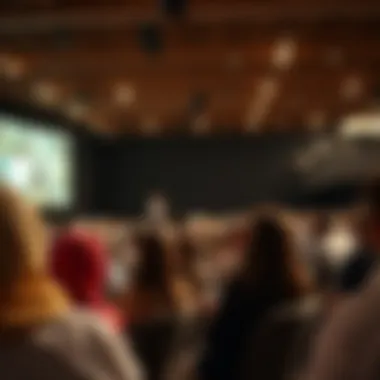

This phenomenon is especially evident during local festivals and events, where artists get the opportunity to share the stage with international acts. Such interactions often lead to collaborative projects, creating a fertile ground for creative exchange. In a sense, open theatres can be viewed as the beating heart of Dubai's artistic community—where talent is nurtured, and the arts are cherished.
Moreover, the accessibility of open theatre spaces means that a wider audience can experience performances firsthand. This open access enriches the cultural fabric of Dubai, inviting diverse groups of people to engage with the arts and connect with local stories, ultimately fostering a sense of belonging among residents.
Cultural Exchange and Dialogue
Beyond celebrating local talent, open theatres serve as venues for cultural exchange and dialogue. In a global city like Dubai, where cultures converge, these spaces become essential for showcasing international performances alongside local works. This blend creates an atmosphere of cross-cultural interaction that can stimulate discussions and foster a better understanding of different perspectives.
"In the open theatre, dialogue isn’t just encouraged; it's essential for developing a community that values understanding and cooperation."
By hosting events that feature diverse artistic voices from around the world, open theatres help to break down cultural barriers. Audiences are introduced to new ideas and experiences, challenging preconceived notions and stereotypes. This exchange can be transformative—not only for the audiences but also for the artists who share their stories in these venues.
Key Open Theatres in Dubai
Understanding the open theatre landscape in Dubai is crucial for grasping how the city embraces culture and encourages artistic expression. The theatres situated across the city serve not only as performance venues but also as symbols of community engagement and cultural enrichment. Open theatres draw locals and tourists alike, acting as hubs where creativity flourishes and where diverse artistic disciplines intermingle. They foster an environment that encourages participation, offering residents a unique taste of live performances under the vast skyline of Dubai.
In this section, we will dive into three notable open theatres that embody this concept: Dubai Opera, Alserkal Avenue, and City Walk Outdoor Theatre. These venues not only present varied programming but also bolster Dubai’s position as a cultural beacon in the region.
Dubai Opera
Dubai Opera stands as a landmark in the heart of the city, showcasing world-class performances that span opera, ballet, concerts, and even theatrical productions. More than just a theatre, it is designed to resemble a traditional sailing vessel, reflecting Dubai's maritime history. Designed by the renowned architect Janus Rostock, this stunning structure is not merely about aesthetics; it also serves practical purposes, offering flexible seating arrangements to accommodate different types of performances.
The facility is equipped with state-of-the-art technology, ensuring that both performers and audience members experience a seamless show. The acoustic design is particularly noteworthy, allowing even the quietest whispers to resonate clearly. The venue often hosts a range of productions that target both local artists and international talents, which enhances cultural exchange and provides up-and-coming artists with a stage to present their work.
"Dubai Opera acts not just as a theatre but as a cultural epicenter that fosters a vibrant artistic community."
Alserkal Avenue
Once a humble industrial zone, Alserkal Avenue has transformed into Dubai's creative core, housing art galleries, theatres, and cultural initiatives. This open space fosters creativity and innovation by hosting a variety of events. The community-driven spirit of Alserkal Avenue makes it distinct; it hosts numerous workshops, exhibitions, and performance art events, encouraging public participation and interactivity.
Among the conversion of warehouses into venues, one of the most notable is The Yard, an outdoor space for performances and screenings. The informal setup allows for a relaxed atmosphere, making it easier for local talents to share their work in a supportive environment. Such venues help to enhance the cultural fabric of Dubai, bridging connections between artists and audiences amid a bustling urban setting.
City Walk Outdoor Theatre
City Walk Outdoor Theatre showcases the quintessential Dubai experience, combining leisure and the arts. Positioned within the sophisticated City Walk area, this open-air venue is unique in blending several influences—from contemporary architecture to lush green spaces. It’s designed as a community gathering space where performances can take place, from film screenings to live music, appealing to families and art enthusiasts alike.
The venue boasts a large LED screen, making it accessible for a variety of events, promoting community engagement through special programming during cultural festivals or holidays. This fusion of entertainment, dining, and leisure turns City Walk into a meeting point for both locals and expatriates, enhancing community ties and fostering inclusion across diverse demographics.
Programming and Events
Programming and events are at the heart of what makes open theatres in Dubai vibrant cultural hotspots. Their significance transcends mere entertainment; they serve as platforms where communities converge to experience art, share narratives, and build social bonds. The kinds of shows and gatherings hosted in these spaces contribute to fostering local talent while enriching the cultural fabric of Dubai.
By prioritizing a diverse array of programming options, open theatres highlight talent across various artistic disciplines, from music festivals to theatrical performances, thus drawing in audiences from all walks of life. This allows greater exposure to both local and international artists, facilitating an exchange of ideas that can often spark creative collaborations. More importantly, the events cater to the interests of residents and tourists alike, ensuring that there’s something on offer for everyone, from family-friendly productions to avant-garde performances.
When considering programming, factors such as seasonal variations, community interests, and cultural calendars come into play. For instance, organizing events around Islamic holidays or local traditions ties performances to the deeper cultural context, making them more relatable and engaging for the audience. Thus, programming isn't just about putting on a show; it’s about community relevance.
Festival Highlights
Festivals curated in open theatres offer an opportunity to celebrate local culture while attracting visitors from around the globe. Events like the Dubai Shopping Festival and the Dubai Opera Festival not only showcase artistic talent but also stimulate the city’s economy by drawing in tourists. Different segments of the population engage with the art, from traditional performances that reflect the history of the Emirate to contemporary pieces that challenge societal norms.
- Local artists take center stage alongside international acts, enriching the viewer's experience.
- Opportunities for interaction and engagement with performers often accompany these festivals, fostering a sense of community.
- Festivals showcase not just performances, but also artists' workshops, creating a learning environment that encourages creativity.
Moreover, being part of a festival allows viewers to network, share ideas, and engage in cultural dialogues, ultimately enhancing their connection to the local arts scene.
Community Events and Workshops
Community events form a crucial pillar for open theatres, creating an inclusive atmosphere where everyone feels welcome to participate. Workshops, in particular, provide hands-on experiences that encourage personal growth and skill development among residents. They cater to a wide demographic, from children interested in theater to adults looking to explore new forms of artistic expression.
These events offer unique benefits:
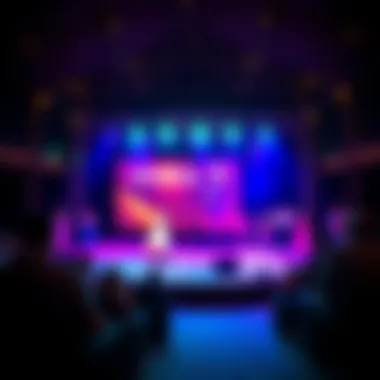
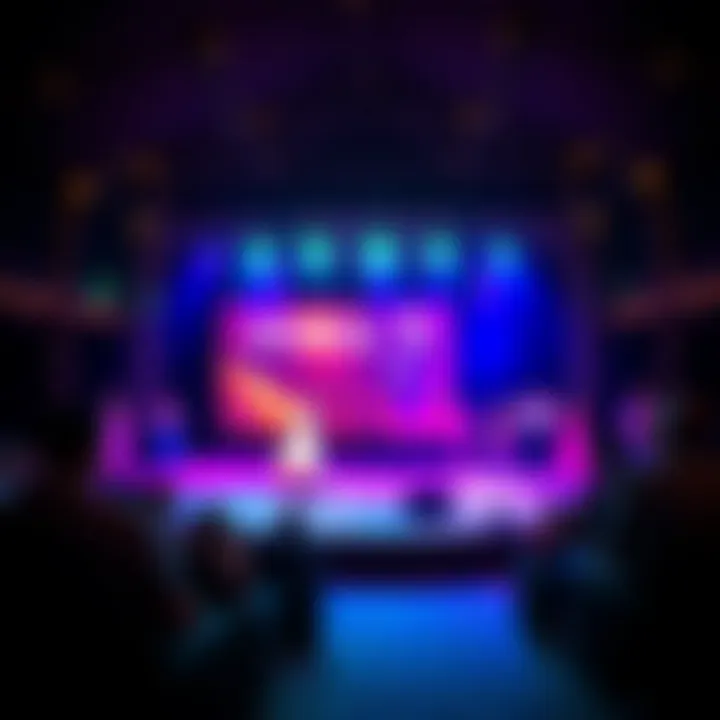
- Strengthening community ties as participants collaborate on creative projects.
- Facilitating art in education, encouraging young people's interest in the arts. Engage schools with programs that integrate performance art into the curriculum.
- Access to professional guidance from trained artists fosters a nurturing environment for aspiring talents.
Often informal gatherings or open-mic nights are organized as part of the community events, allowing individuals to showcase their work in a supportive environment. This can create a ripple effect, encouraging participation that extends beyond predefined performances, ultimately engendering a culture of ongoing engagement and passion for the arts.
Ultimately, the programming and events held in open theatres in Dubai aren't merely about entertainment; they epitomize community connectivity and the rich tapestry of cultural expression. As these venues continue to evolve, their role in shaping the cultural narrative of Dubai remains a vital aspect of urban life.
"The involvement in arts is not just about watching a performance; it’s about being part of a cultural revolution in your own backyard."
For further resources, check out:
Challenges Faced by Open Theatres
Open theatres in Dubai, while enriching the cultural landscape, encounter various challenges that influence their operation and sustainability. Understanding these hurdles is vital for anyone interested in the ongoing growth of the arts in the region. This section examines two of the primary challenges: weather conditions and financial sustainability, as both play significant roles in shaping the future of these performance spaces.
Weather and Environmental Factors
Dubai's climate can be a double-edged sword for open theatres. With scorching summers where temperatures can reach upwards of 50 degrees Celsius, outdoor performances often face interruptions or cancellations. The high humidity levels during certain periods can also affect both the comfort of the audience and the performers' experiences, which can lead to diminished turnout at events.
To combat these environmental challenges, many theatres have begun to incorporate innovative shading solutions and advanced cooling systems. For instance, the Dubai Opera has integrated shaded areas to enhance visitor comfort. But these adaptations come with costs, and not all open theatres can afford such investments.
- Audience Comfort: Ensuring attendees are comfortable while enjoying performances is crucial.
- Protective Measures: Solutions like retractable roofs can provide flexibility but aren’t always feasible for all venues.
"An open theatre’s ability to operate effectively is often dependent on its architecture’s compatibility with local weather conditions."
Funding and Sustainability
Financial stability is perhaps one of the most significant hurdles facing open theatres in Dubai. Many rely on public funding or sponsorships to cover operational costs, which can be inconsistent. If a theatre's programming doesn't draw enough attendance, it might struggle to cover even basic expenses.
Moreover, as arts funding can fluctuate due to economic conditions, theatres need to develop reliable revenue streams. Many opt for:
- Diverse Programming: Offering various events, from music to theatre, targeting different audience demographics can increase attendance.
- Partnerships with Corporates: Collaborating with businesses can provide additional funding while promoting local art.
Additionally, engaging the community through workshops and educational programs can create a sense of ownership and loyalty, thus promoting attendance and revenue. But not all projects get such support, and theatres have to navigate this tricky economic landscape, weighing between artistic freedom and financial viability.
Sustainability isn’t just about finances; it's also about environmentally-friendly practices. Incorporating green technology, like solar panels or sustainable materials in construction, can have long-term benefits but generally requires substantial initial investment. Ultimately, the success of open theatres in Dubai hinges on strategically addressing these challenges, ensuring they remain vibrant pillars of the community and culture.
Future of Open Theatres in Dubai
The future of open theatres in Dubai holds promise, with myriad possibilities on the horizon. As the cultural landscape of this vibrant city continues to evolve, open theatres present a unique opportunity for shaping urban life and enriching social interactions. They offer a flexible environment that encourages innovation in performance arts and community engagement.
The integration of open theatres into Dubai's urban framework can provide benefits that extend beyond mere entertainment. They can serve as crucial spaces for cultural dialogue, fostering a sense of community while promoting local talent. By drawing people from diverse backgrounds, these theatres can ultimately enhance the city’s identity and character.
Trends in Performance Spaces
In the realm of performance spaces, there are several notable trends that are shaping the future of open theatres in Dubai. The demand for outdoor venues has surged, responding to a growing appreciation for al fresco experiences. Here are some key trends:
- Multipurpose Designs: Open theatres are increasingly being designed with flexibility in mind. These spaces can host a variety of events, ranging from concerts to art exhibitions and community gatherings.
- Community-Centric Programming: More focus is expected to be placed on programming that reflects the interests of the local community. This might include grassroots performances and workshops aimed at engaging residents of all ages.
- Sustainability Practices: Eco-friendly materials and designs will play a critical role in future constructions. The integration of green spaces and sustainable technologies is becoming a norm, ensuring that open theatres not only provide cultural benefits but also promote environmental responsibility.
Technological Advancements and Impact
Technological advancements are poised to significantly influence the evolution of open theatres in Dubai. Emerging tech solutions are transforming not only how performances are delivered but also how audiences experience them. Here are some anticipated impacts:
- Enhanced Audience Engagement: Virtual reality and augmented reality can create immersive experiences, allowing audiences to engage with performances on a different level. Imagine watching a traditional dance while being surrounded by a digitally rendered environment that tells a deeper story.
- Improved Accessibility: Tech innovations are likely to enhance the accessibility of performances. Livestreaming events could allow those unable to attend in person to participate from anywhere in the world, broadening the reach of local artists.
- Smart Infrastructure: The advent of smart technologies can lead to a more efficient management of open theatres. From crowd control systems to energy management, utilizing advanced technology could streamline operations and enhance visitor experiences.
The intersection of culture and technology can significantly redefine the audience's relationship with performance art, making it more participatory and dynamic.
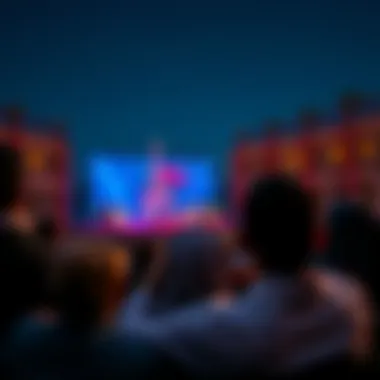

As Dubai continues to embrace the open theatre concept, it is essential that city planners, investors, and local artists work collaboratively to harness these trends and technologies. Ultimately, the open theatres can becoming not only platforms for performance but also hubs for community interaction and cultural exchange.
Impact on Community Engagement
Open theatres in Dubai serve as vibrant hubs that foster community engagement, bridging gaps between artistic expression and local involvement. These theatres are not merely gathering spots for performances; they are platforms that empower communities, create dialogue, and strengthen the fabric of society. The presence of an open theatre invites the community to step away from their routines, engage with the arts, and connect with one another.
Encouraging Local Participation
Local participation is the heart and soul of any thriving arts scene. In Dubai, open theatres actively involve residents by introducing programs tailored to diverse interests. Workshops, open mic nights, and community-led events play a crucial role in welcoming individuals from all walks of life. Here are some ways open theatres encourage local participation:
- Workshops and Classes: Open theatres often host workshops that allow residents to explore their artistic talents. Whether it’s acting, dance, or music, these opportunities make the arts accessible to everyone.
- Showcasing Local Talent: Theatres provide a stage for local artists to perform, raising their profiles and connecting them with wider audiences. This visibility can spark collaborations and foster community support.
- Family-Friendly Activities: With events designed for families, open theatres encourage engagement among different generations. This aspect helps to cultivate a culture where the arts become a collective family experience.
As the saying goes, "Many hands make light work," and in this context, the collective effort of the community can lead to a vibrant, rich arts culture that benefits everyone.
Fostering Social Connections
Open theatres create spaces where social connections can flourish. They offer platforms where individuals can gather, share experiences, and build relationships. Various aspects of open theatres contribute to this.
- Diverse Audiences: With performances attracting a mix of nationalities, open theatres in Dubai become melting pots of culture. This diversity enhances the communal experience, as people from various backgrounds come together to appreciate the arts.
- Networking Opportunities: The interactions that occur within these spaces can lead to unexpected partnerships and friendships. For artists and business owners alike, these connections can be pivotal in pursuing new projects.
- Shared Experiences: Besides performances, open theatres also host discussions and panels that encourage audience interaction. The exchange of ideas can stimulate important conversations and create a sense of belonging.
"Art is the most beautiful of all lies; it allows us to perceive the world through different lenses."
In summary, the impact of open theatres on community engagement in Dubai is profound. They not only draw audiences together through the arts but also nurture neighborhood ties, encourage creativity, and foster social interactions. As urban areas like Dubai continue to evolve, the role of these theatres in enhancing community spirit cannot be understated.
Role of Open Theatres in Urban Development
Open theatres serve as more than mere venues for performances; they are instrumental in shaping the urban landscape and fostering community ties. In Dubai, a city marked by rapid development and a melting pot of cultures, these theatres play a pivotal role in enhancing the identity of the city and attracting a diversity of visitors and investors.
Enhancing City Identity
The integration of open theatres into Dubai's urban framework is a blueprint for enhancing the city's identity. They bridge the gap between traditional art forms and contemporary expressions, offering a platform where the city's unique blend of cultures can converge. With performances that often reflect the rich cultural tapestry of the region, these open spaces invite residents and tourists alike to engage with the stories and experiences that define Dubai.
Moreover, open theatres like the Dubai Opera and outdoor spaces at Alserkal Avenue are sculptural landmarks. Their innovative architecture adds a distinctive character to the surrounding areas. For instance, the Dubai Opera seamlessly merges traditional Islamic design with a modern aesthetic, creating a landmark that represents both the city's heritage and its forward-looking vision. Local residents take pride in these structures, as they signify a fusion of global influence and local artistry.
In addition to physical representation, open theatres foster a sense of belonging among diverse communities by hosting events that highlight local traditions, art exhibitions, and cultural festivals. This approach transforms these venues into communal spaces where actions and interactions build bridges, allowing the city to be seen not just as a place of commerce, but as a hub of creativity and culture.
Attracting Tourism and Investment
Open theatres in Dubai also attract tourism in a variety of ways. They serve as cultural magnets, drawing not only those who seek entertainment but also individuals looking to immerse themselves in the local arts scene. This influx of visitors translates into increased spending in adjacent businesses, contributing to the local economy. Performance art draws audiences of all walks of life, thereby creating a multicultural cocoon that celebrates the global nature of Dubai.
The investment potential is significant. Developers see open theatres as key assets that can elevate property values and enhance the allure of residential and commercial projects. By integrating theatres into the urban plan, developers can create vibrant, mixed-use neighborhoods that entice both residents and businesses.
- Increased Foot Traffic: These areas become bustling with people, creating opportunities for retail and hospitality sectors to thrive.
- Cultural Tourism: With various events held year-round, the potential for cultural tourism skyrockets, giving a boost to hotels and local attractions.
- Corporate Sponsorships: Open theatres often attract sponsorship from corporations, wanting to associate themselves with the cultural identity of Dubai.
"As open theatres continue to integrate into the urban narrative of Dubai, they reinforce the city’s commitment to cultural enrichment while enticing both visitors and investors."
Closure
As we reach the end of this exploration into the open theatre concept in Dubai, it’s crucial to reflect on the significance of these vibrant spaces. Open theatres do not merely serve as venues for performances; they stand as pivotal elements in the cultural and urban tapestry of Dubai. They bring together artists and audiences in an environment that encourages creativity and community engagement.
Summary of Key Insights
Throughout this article, a variety of insights have highlighted the multifaceted role of open theatres:
- Community Engagement: Open theatres foster participation from local residents, nurturing a sense of belonging and pride in the shared artistic endeavors.
- Cultural Exchange: These venues often become melting pots of cultural expression, allowing local and international artists to collaborate and share their skills.
- Architectural Innovation: The design elements of open theatres reflect the dynamic architectural spirit of Dubai, integrating seamlessly with urban landscapes to create inviting spaces.
- Programming Variety: From festivals to community workshops, the diverse range of events caters to all demographics, enriching the cultural offerings of the city.
Moreover, the potential challenges faced, such as weather and funding, underline the need for sustainable management practices. Addressing these issues with foresight can ensure that these theatres thrive, supporting the local arts scene for years to come.
Future Prospects for Open Theatre in Dubai
Looking ahead, the prospects for open theatres in Dubai are promising. With burgeoning interest in arts and culture, we can anticipate:
- Enhanced Technological Integration: The theatre experiences will increasingly incorporate technology, from innovative lighting designs to virtual reality experiences, enhancing engagement.
- Increased Tourism: As open theatres gain recognition, they are likely to attract more international visitors, contributing to the economic vitality of the area.
- Sustainability Initiatives: There may be a shift towards greener practices in theatre operations, ensuring that events are environmentally conscious.
- Global Collaborations: Partnerships with international arts organizations could lead to unique programming and showcase Dubai’s cultural diversity on a global stage.
Through these developments, open theatres are poised to play an indispensable role in shaping the future of Dubai’s arts landscape, providing spaces for artistic expression, dialogue, and community connection. This concept of open theatre not only reflects the city’s modern ethos but also promises to keep the spirit of creative exploration alive in an ever-evolving urban environment.











